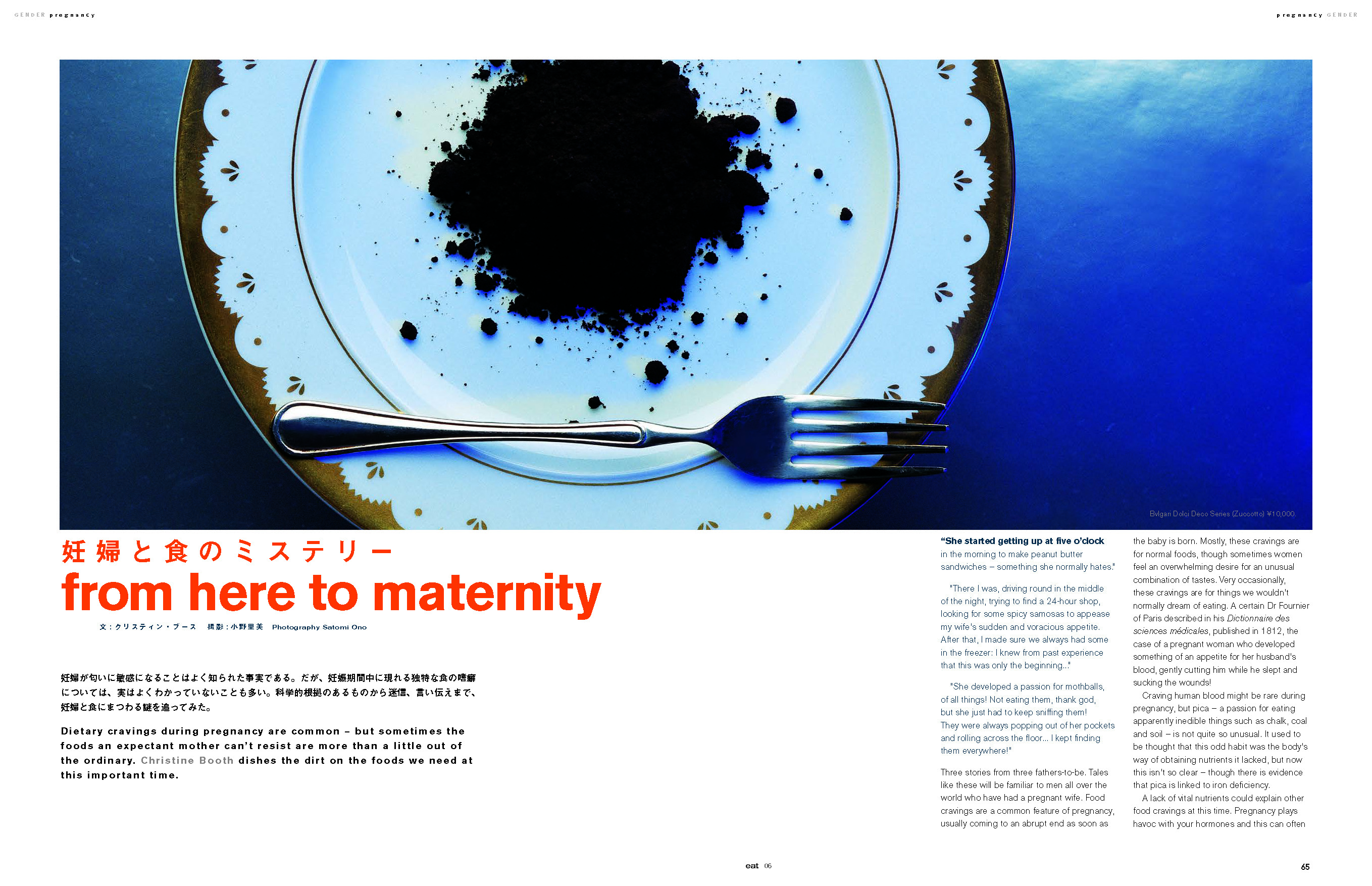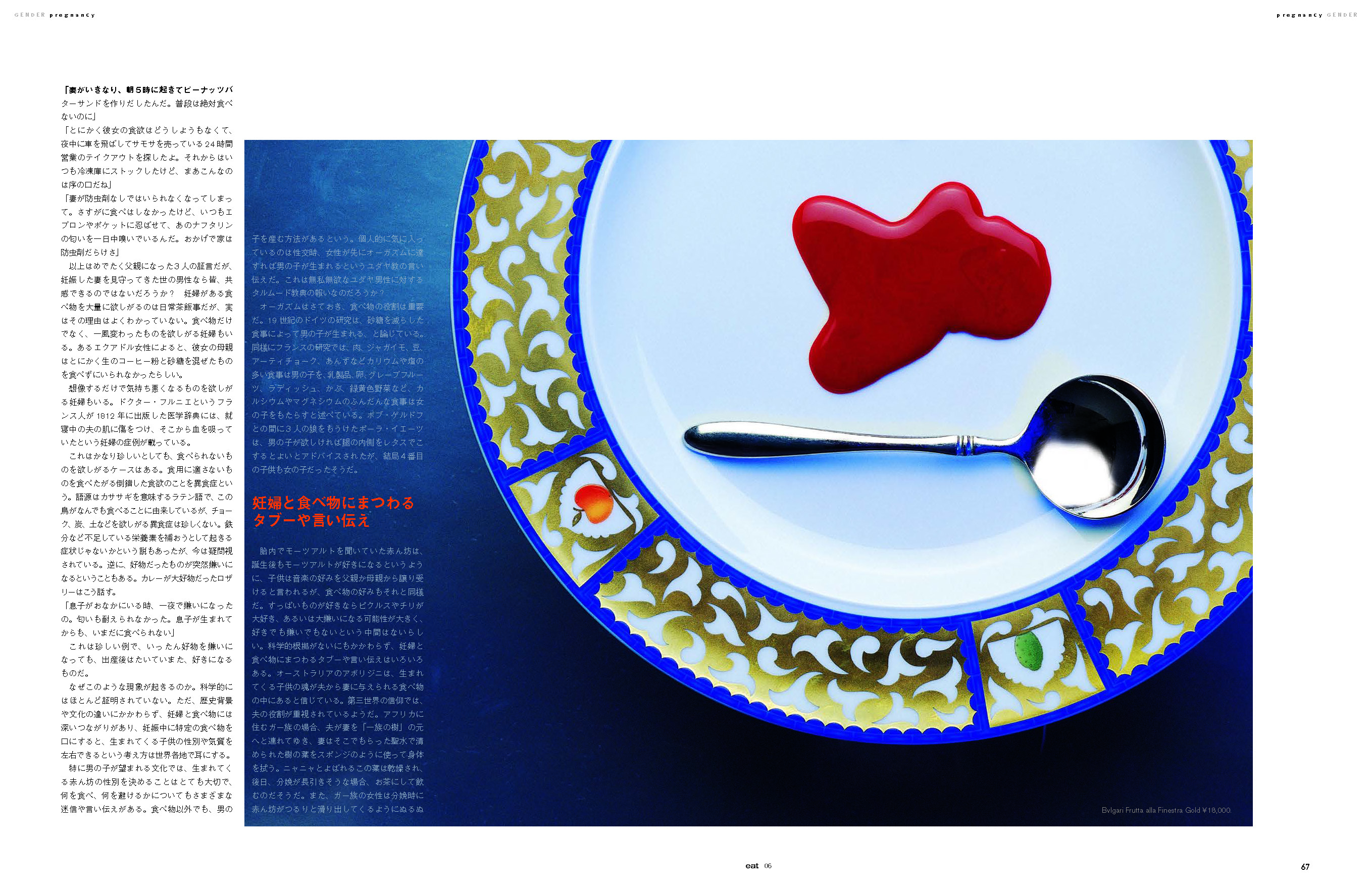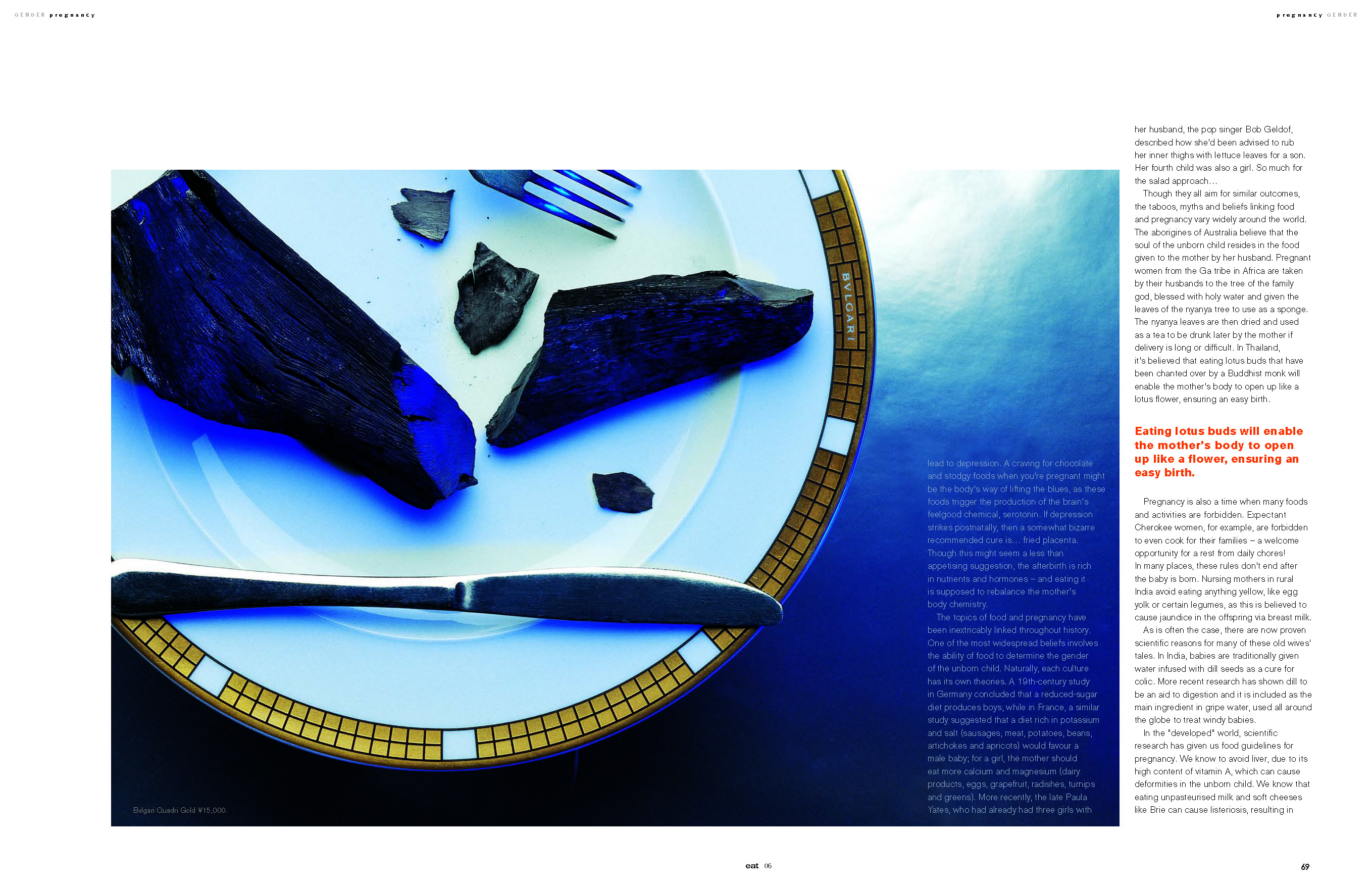From Here to Maternity
Eat Issue 6: Gender
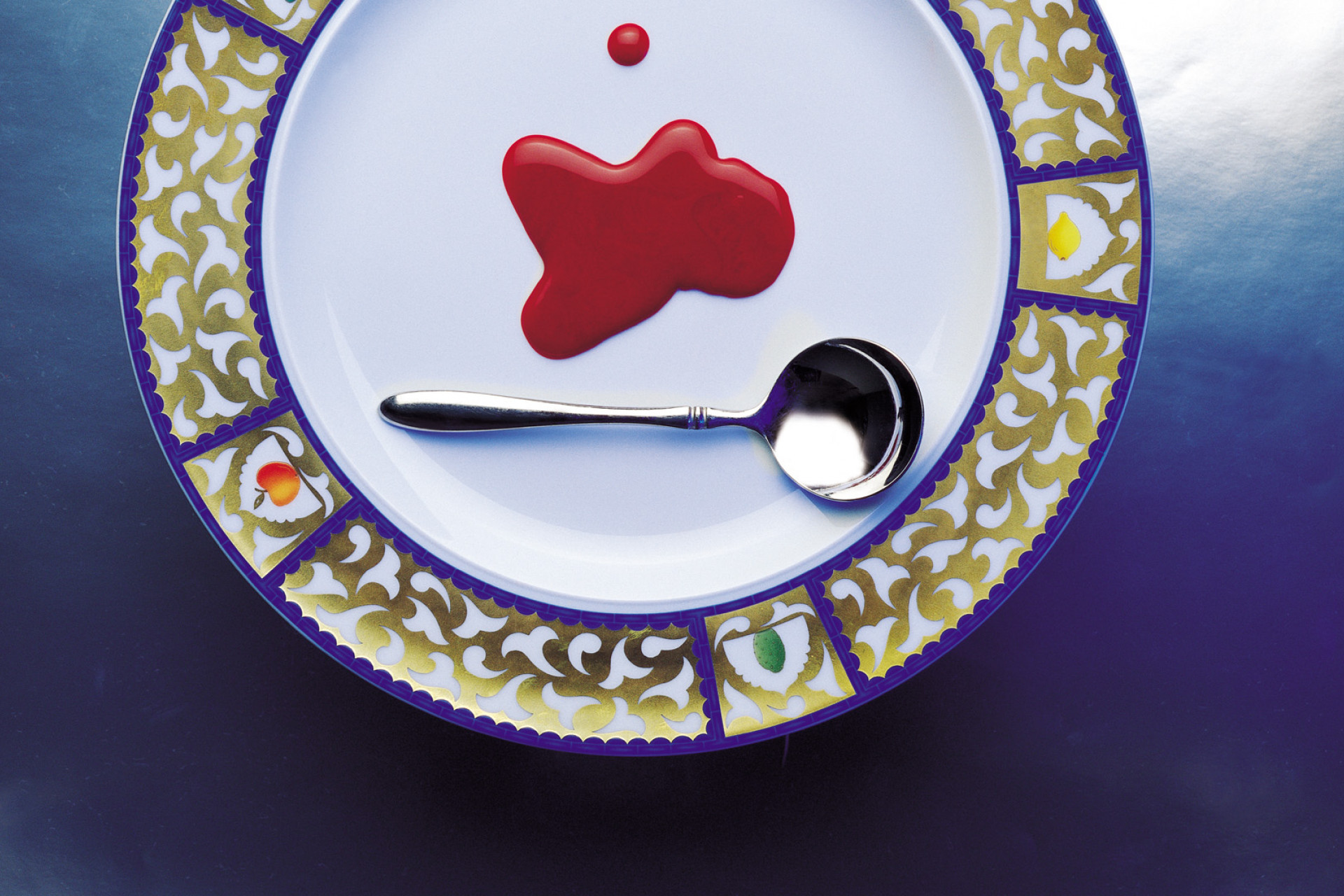
This article was originally published in August 2001.
Dietary cravings during pregnancy are common – but sometimes the foods an expectant mother can’t resist are more than a little out of the ordinary. Christine Booth dishes the dirt on the foods we need at this important time.
“She started getting up at five o’clock in the morning to make peanut butter sandwiches – something she normally hates.”
“There I was, driving round in the middle of the night, trying to find a 24-hour shop, looking for some spicy samosas to appease my wife’s sudden and voracious appetite. After that, I made sure we always had some in the freezer: I knew from past experience that this was only the beginning...”
“She developed a passion for mothballs, of all things! Not eating them, thank god, but she just had to keep sniffing them! They were always popping out of her pockets and rolling across the floor... I kept finding them everywhere!”
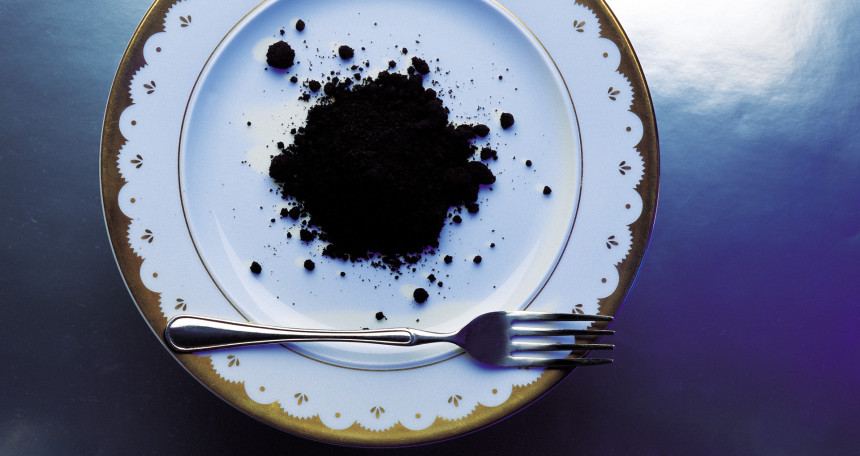
Three stories from three fathers-to-be. Tales like these will be familiar to men all over the world who have had a pregnant wife. Food cravings are a common feature of pregnancy, usually coming to an abrupt end as soon as the baby is born. Mostly, these cravings are for normal foods, though sometimes women feel an overwhelming desire for an unusual combination of tastes. Very occasionally, these cravings are for things we wouldn’t normally dream of eating. A certain Dr Fournier of Paris described in his Dictionnaire des sciences médicales, published in 1812, the case of a pregnant woman who developed something of an appetite for her husband’s blood, gently cutting him while he slept and sucking the wounds!
Craving human blood might be rare during pregnancy, but pica – a passion for eating apparently inedible things such as chalk, coal and soil – is not quite so unusual. It used to be thought that this odd habit was the body’s way of obtaining nutrients it lacked, but now this isn’t so clear – though there is evidence that pica is linked to iron deficiency.
A lack of vital nutrients could explain other food cravings at this time. Pregnancy plays havoc with your hormones and this can often lead to depression. A craving for chocolate and stodgy foods when you’re pregnant might be the body’s way of lifting the blues, as these foods trigger the production of the brain’s feelgood chemical, serotonin. If depression strikes postnatally, then a somewhat bizarre recommended cure is… fried placenta. Though this might seem a less than appetising suggestion, the afterbirth is rich in nutrients and hormones – and eating it is supposed to rebalance the mother’s body chemistry.
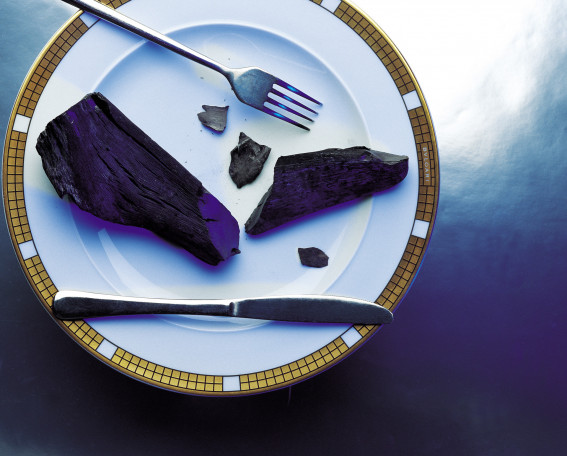
The topics of food and pregnancy have been inextricably linked throughout history. One of the most widespread beliefs involves the ability of food to determine the gender of the unborn child. Naturally, each culture has its own theories. A 19th-century study in Germany concluded that a reduced-sugar diet produces boys, while in France, a similar study suggested that a diet rich in potassium and salt (sausages, meat, potatoes, beans, artichokes and apricots) would favour a male baby; for a girl, the mother should eat more calcium and magnesium (dairy products, eggs, grapefruit, radishes, turnips and greens). More recently, the late Paula Yates, who had already had three girls with her husband, the pop singer Bob Geldof, described how she’d been advised to rub her inner thighs with lettuce leaves for a son. Her fourth child was also a girl. So much for the salad approach…
Though they all aim for similar outcomes, the taboos, myths and beliefs linking food and pregnancy vary widely around the world. The aborigines of Australia believe that the soul of the unborn child resides in the food given to the mother by her husband. Pregnant women from the Ga tribe in Africa are taken by their husbands to the tree of the family god, blessed with holy water and given the leaves of the nyanya tree to use as a sponge. The nyanya leaves are then dried and used as a tea to be drunk later by the mother if delivery is long or difficult. In Thailand, it’s believed that eating lotus buds that have been chanted over by a Buddhist monk will enable the mother’s body to open up like a lotus flower, ensuring an easy birth.
Eating lotus buds will enable the mother’s body to open up like a flower, ensuring an easy birth.
Pregnancy is also a time when many foods and activities are forbidden. Expectant Cherokee women, for example, are forbidden to even cook for their families – a welcome opportunity for a rest from daily chores! In many places, these rules don’t end after the baby is born. Nursing mothers in rural India avoid eating anything yellow, like egg yolk or certain legumes, as this is believed to cause jaundice in the offspring via breast milk.
As is often the case, there are now proven scientific reasons for many of these old wives’ tales. In India, babies are traditionally given water infused with dill seeds as a cure for colic. More recent research has shown dill to be an aid to digestion and it is included as the main ingredient in gripe water, used all around the globe to treat windy babies.

In the “developed” world, scientific research has given us food guidelines for pregnancy. We know to avoid liver, due to its high content of vitamin A, which can cause deformities in the unborn child. We know that eating unpasteurised milk and soft cheeses like Brie can cause listeriosis, resulting in miscarriage, still-birth or deformities, and that expectant mothers should eat more calcium (for bone growth) and, in general, more calories (an extra 200 a day.) We know that folic acid (found in broccoli, spinach, sweet corn and asparagus) plays an important part in the development of organs and tissues, and a lack of it can cause neural tube defects, such as spina bifida and cleft palate. It’s also believed that omega-3 fatty acids play a star role during the last three months of gestation, when the foetus’s brain and eye development is at its peak. Perhaps this is the time for mums-to-be to eat lots of oily fish, such as salmon, tuna, mackerel, sardine or herring for a bright-eyed and clever kid.
And if you’re aiming for more than one healthy baby, perhaps food could be the answer. The Yoruba tribe of Nigeria is noted for its high rate of twin births – four times higher than the rest of the world. The people here regard the birth of twins as a blessing from God and attribute this phenomenon to their high consumption of yams, along with malla soup and kassa flour. So there you have it. If you want to have twins, eat yam.
Text: Christine Booth / Photo: Satomi Ono
